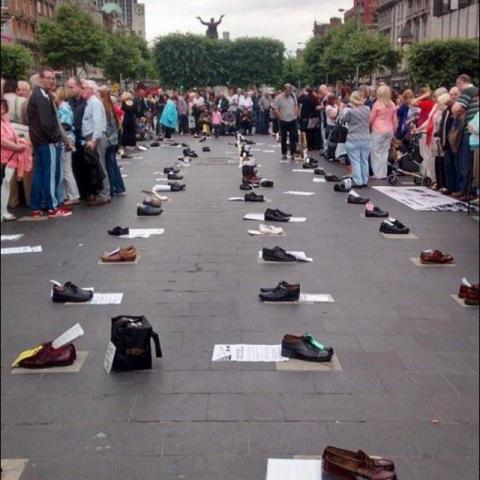'In their Footsteps'
This campaign is a call on the British & Irish governments to implement an acceptable and effective mechanism to deal with the past. Any family who lost a loved one during the conflict, or individuals who were seriously injured during the conflict are welcome to provide a pair of shoes and a note as part of the exhibition.

How did this campaign come about?
This initiative began as an idea between the Bloody Sunday Trust & the Pat Finucane Centre to mark the anniversary of the publication of the Saville Inquiry report into Bloody Sunday in a way that would be respectful to the memory of those killed on 30st January 1972, but also highlight the many families who lost loved ones in single incidents or other atrocities.
This campaign has grown to include families from the McGurks’s bar bombing, the Ballymurphy Massacre, Loughlinisland, Kelly’s bar bombing, the Springhill massacre, victims of the MRF and the Mount Vernon gang, the Glenanne gang, as well as victims from the bombings in Dublin, Monaghan, Dundalk & Castleblaney.
Along with shoes representing victims from those atrocities are scores of shoes from families who lost loved ones in single incidents. No one group or individual owns the exhibition.
What is the purpose of the campaign?
This campaign is a call on the British & Irish governments to implement an acceptable and effective mechanism to deal with the past. To date the families have held various Days of Action as part of this campaign in Dublin, Belfast, London, Derry and Stormont.
Who can add shoes?
Any family who lost a loved one during the conflict, or individuals who were seriously injured during the conflict are welcome to provide a pair of shoes and a note as part of the exhibition if they want the British & Irish governments to implement an independent, acceptable and effective mechanism to deal with the past.
What is unique about this campaign is that all the victims here are represented equally, regardless of the status of the victim or who the perpetrator was, or whether their loved one was killed as part of a mass atrocity or in a single incident. That is why it is so powerful. There is no hierarchy of victims. The families are united in asking for the past to be dealt with.
